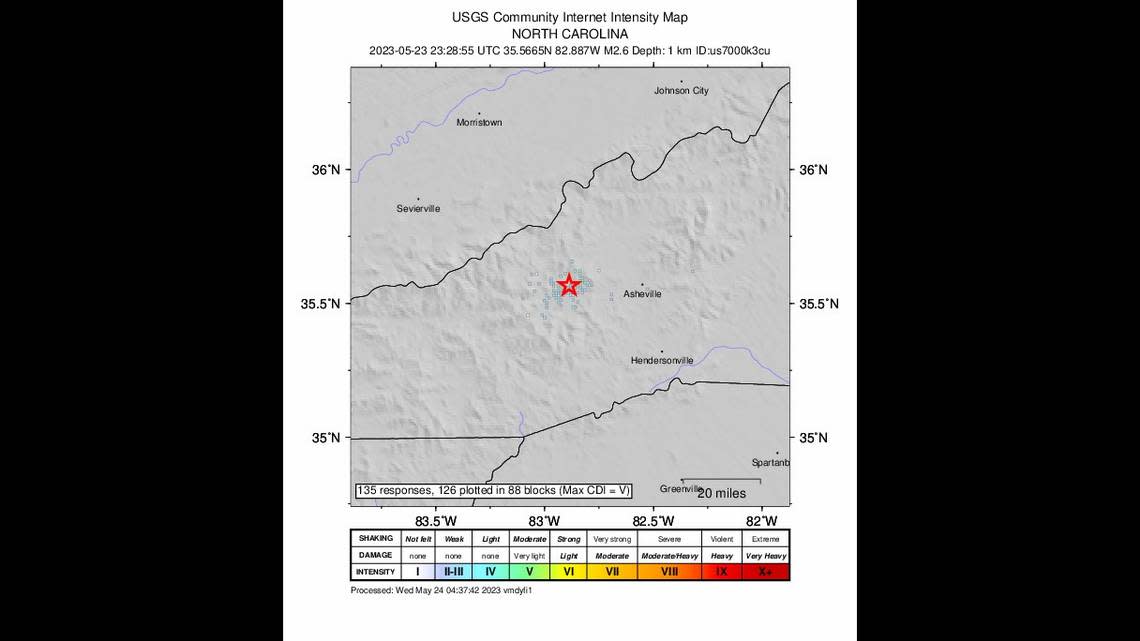Shaking from 2.6 magnitude earthquake felt by dozens in NC mountains, geologists say

A 2.6 magnitude earthquake was felt by dozens of people Tuesday, May 23, in the North Carolina mountains, but it caused no damage, according to the United States Geological Survey.
It occurred around 7:30 p.m. and was centered 2.5 miles northwest of the unincorporated West Canton, about 135 miles west of Charlotte.
The USGS says the shaking emerged from a geologic disturbance about 3,600 feet deep. More than 130 people filed witness reports, including one from 32 miles away in Black Mountain.
Most reports came from the towns of Clyde and Canton, where weak shaking was reported, the USGS says.
Earthquakes occur sporadically in the Appalachian Mountains, where old fault lines exist, experts say.
“In areas with lots of old faults, like the Appalachians, we tend to get earthquakes along pre-existing fault zones that have weakened rock at depth,” according to the Department of Geological and Environmental Sciences at Appalachian State University.
“Even though the southern Appalachians are not currently at an active plate boundary, our tectonic history means that built-up stresses from time to time are able to be released along old faults from the building of the Appalachians, which happened hundreds of millions of years ago.”
Waves from East Coast quakes also travel “a lot further from their epicenter compared to the west coast,” due to the rock being “older and colder,” the university says.
What to do in an earthquake
Earthquakes’ sudden, rapid shaking can cause fires, tsunamis, landslides or avalanches. They can happen anywhere, but they’re most common in Alaska, California, Hawaii, Oregon, Puerto Rico and Washington, according to the Department of Homeland Security.
If an earthquake strikes, it’s best to protect yourself right away. Here are tips from experts:
If you’re in a car: Pull over and stop. Set your parking brake.
If you’re in bed: Turn face-down and cover your head with a pillow.
If you’re outdoors: Stay away from buildings. Don’t go inside.
If you’re inside: Stay and don’t run outdoors. Stay away from doorways.
The best way to protect yourself during an earthquake is to drop, cover and hold on, officials say.
“Wherever you are, drop down to your hands and knees and hold onto something sturdy,” officials say. “If you’re using a wheelchair or walker with a seat, make sure your wheels are locked and remain seated until the shaking stops.”
Be sure to cover your head and neck with your arms, and crawl under a sturdy table if possible. If no shelter is available, crawl to an interior wall away from windows.
Once under a table, officials say you should hold on with one hand and be ready to move with it.
“There can be serious hazards after an earthquake, such as damage to the building, leaking gas and water lines, or downed power lines,” officials say. “Expect aftershocks to follow the main shock of an earthquake. Be ready to Drop, Cover, and Hold On if you feel an aftershock.”
Odd 4.5-magnitude earthquake reported in deep ocean southeast of NC’s Outer Banks
$400,000 home is the latest to collapse into the ocean on North Carolina Outer Banks
Town’s 600 earthquakes a week are due to magma reservoir under it, Hawaii study finds

